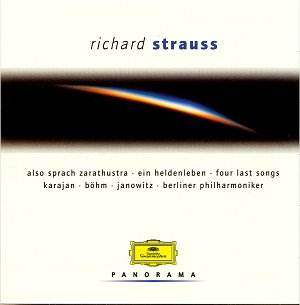Richard STRAUSS
(1864-1949)
Also sprach Zarathustra, Op. 30a. Horn Concerto No. 2 in
E flat, AV132b. Vier letzte Lieder, Op.
Posthc. Don Juan, Op. 20d. Till Eulenspiegels
lustige Streiche, Op. 28d. Ein Heldenleben, Op.
40a.
 bNorbert
Hauptmann (horn); cGundula Janowitz (soprano); Berlin Philharmonic
Orchestra/abcHerbert von Karajan, dKarl
Böhm.
bNorbert
Hauptmann (horn); cGundula Janowitz (soprano); Berlin Philharmonic
Orchestra/abcHerbert von Karajan, dKarl
Böhm.
 DG Panorama 469 208-2
[two discs] [156'09]
[ADD]
DG Panorama 469 208-2
[two discs] [156'09]
[ADD]
Crotchet

The star performance of this Panorama twofer is that of the Four Last
Songs. Gundula Janowitz is in full, resplendent voice and Karajan captures
perfectly the autumnal, quasi-valedictory quality. The peaceful glow of the
fourth song, Im Abendrot, is entirely fitting here. Although I would
not willingly forfeit either Schwarzkopf or Jessye Norman for Janowitz, the
music still comes over as an immensely moving experience.
The 'Karajan splodge' does not seem overdone in this Straussian farewell,
whereas it can be intrusive in the Zarathustra of the same vintage.
The violin swoops of the Introduction or the Grablied now sound
identifiably vintage Karajan, and come as part of the package. Similarly,
you could bathe in Von der Hinterweltern. There are distinct advantages
to this approach too, though: the climax of Tanzlied is positively
orgiastic, and Karajan's sheer control of the orchestra in the concluding
Nachwandlerlied remains breathtaking to this day.
Hauptmann's Second Horn Concerto is technically secure, although he misses
(or has been asked to miss?) the bravura elements in this score. Perhaps
this time the autumnal effect is somewhat overdone, although the slightly
muddy recording does not help.
Karl Böhm's Strauss is painted in bold and confident colours. Even though
his early sixties recording of Don Juan shows its age, there is a
master's understanding of idiom at work here and a surprising amount of detail
comes through. His characterful Till Eulenspiegel is a delight. This
is a notoriously difficult score to bring off successfully and Böhm
comes far closer than most, without displacing Kempe's reference recording.
There is much to recommend in Karajan's 1959 Heldenleben. The opening
pedal note emerges from the depths and sets the monumental tone of the reading.
The recording belies its age (listen to the harp glissandi in The Hero's
Companion). Unfortunately The Hero's Works of Peace fails to achieve
the requisite sense of repose to contrast with the Battle Scene, and this
seems to affect the final Retreat from the World also.
As an introduction to the orchestral works of Strauss, this set will fulfil
its function well. It is also fitting as a monument to what Karajan achieved
in Berlin, whether or not one agrees with his philosophies.
Reviewer
Colin Clarke
Performance
 (
( Four Last
Songs and Till Eulenspiegel)
Four Last
Songs and Till Eulenspiegel)
Recording

